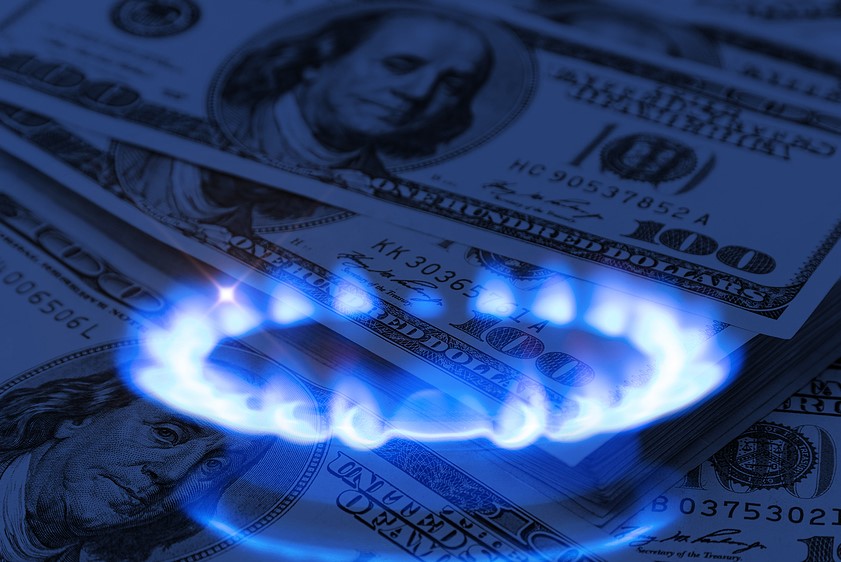Nat Gas Fees Generate $234M as GOP Targets Dems Over Energy Policy

Pennsylvania’s tax on natural gas development generated $234 million in 2021, marking the second-largest amount ever returned to communities across the commonwealth, the Pennsylvania Public Utility Commission (PUC) said Friday.
The natural gas impact fee has generated $2.2 billion in the last decade.
Most of the money goes to county and local governments, however some state agencies also receive funds. The money funds infrastructure, emergency response and environmental programs.
“Generating $2.3 billion in essential funding for state and local governments across all 67 counties, Pennsylvania’s unique natural gas tax is an effective policy that yields impactful results,” Marcellus Shale Coalition president David Callahan said.
Some $234.4 million will be distributed to the state and counties in 2022, with all 67 counties receiving an allotment.
“The nearly 60 percent increase in this year’s distribution is directly related to heightened activity levels and the commodity price environment, underscoring the importance of policies that encourage domestic natural gas development, transportation and use. Our members continue to be focused on responsibly developing clean, abundant Pennsylvania natural gas, which is even more important today in keeping America and our allies’ energy secure,” Callahan said.
American Petroleum Institute Pennsylvania (API PA) Executive Director Stephanie Catarino Wissman said, “Every corner of the commonwealth has directly benefitted from Pennsylvania’s impact fee. This tax on natural gas wells has generated new revenue – totaling more than $2.2 billion over the past decade – for a wide variety of environmental, conservation, infrastructure, public safety and recreation projects. The report shows how natural gas production in Pennsylvania provides hundreds of millions annually in essential revenue while strengthening our economy.”
The impact fee revenue depends on the average annual price of natural gas on the New York Mercantile Exchange (NYMEX), which increased in 2021 compared to 2020, when the demand for natural gas declined due to the COVID-19 pandemic and a mild winter. Impact tax revenue reached $234 million in 2021, nearly 60 percent more than 2020, one of the highest collections since the impact tax was imposed ten years ago.
“As the demand for energy rebounds, policy certainty and long-term energy solutions are needed to help ensure that Americans have access to affordable and reliable energy,” said Wissman. “Pennsylvania’s abundant shale gas presents a unique opportunity to bolster domestic supply while funding critical infrastructure and environmental programs across the state, even in areas without natural gas development.”
This announcement comes when energy companies are under attack by the Biden administration over “excess” profits, a charge that economists dismiss.
Biden took steps to hamstring the energy companies at the onset of his administration, blocking the Keystone XL pipeline and signed executive orders to halt new oil and gas leases on public land, favoring green energy alternatives.
“Getting on a plane right now to go meet with a murderer to talk about the Saudis picking up their production, or writing a letter to the CEOs of Chevron and Exxon to say ‘super-duper large profits won’t be tolerated’ is simply inexcusable,” said economist David L. Bahnsen about Biden’s energy policy.
And while Biden has blamed high gasoline prices on Russian President Putin and the war in Ukraine, he recently pivoted to blame oil companies. But gasoline prices were at an average of $2.27 a gallon nationwide on Jan. 20, 2021 when Biden took office. On Jan. 3, a month before Putin invaded Ukraine, the national average gas price stood at $3.28 a gallon and as of Friday, the average price was $5 a gallon.
And it’s not just Biden.
Congresswoman Madeleine Dean (D-Montgomery) tweeted in March: “The price of crude oil is falling, and that should be reflected at the pump. We must be certain that energy companies are not using an unjust war to profit and price gouge.”
And in a let them eat cake moment, Transportation Secretary Pete Buttigieg said families who buy electric vehicles “never have to worry about gas prices again.”
Meanwhile, the sale price for an EV, on average, was $60,054 in February. That compared to $45,596 on average for all new vehicles, including electric ones, according to data from Edmonds.
Also, there’s the convenience factor. On a recent road trip, a Wall Street Journal reporter said she spent more time charging her rented EV than sleeping.
In a tweet that sums the situation up, Rep. Jim Jordan (R-Ohio) said, “The United States is blowing through its strategic oil reserves faster than expected. Gas is $5 a gallon nationally. And Joe Biden STILL refuses to drill domestically.”
The National Republican Senatorial Committee is making political hay for the 2022 midterms out of the high gas prices. They’re airing a new commercial targeting Democratic Nevada Sen. Catherine Cortez Masto and Democrat John Fetterman, who is running for the Senate, linking them to Biden and the high gas prices.
The ad says Fetterman backs Biden and the Green New Deal.
Please follow DVJournal on social media: Twitter@DVJournal or Facebook.com/DelawareValleyJournal


